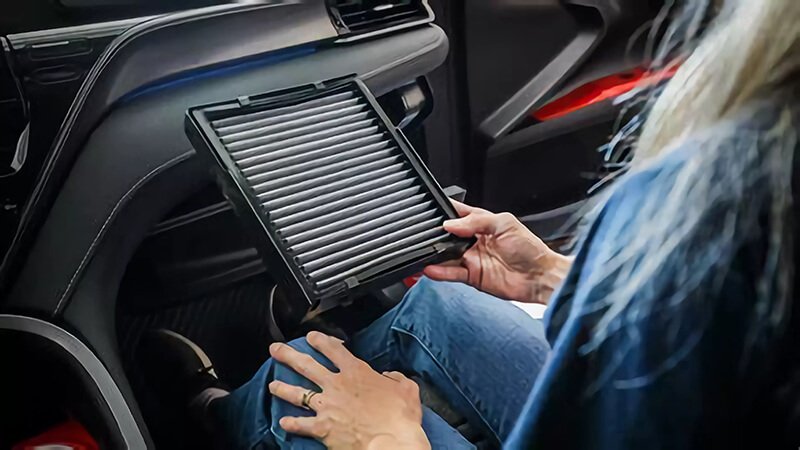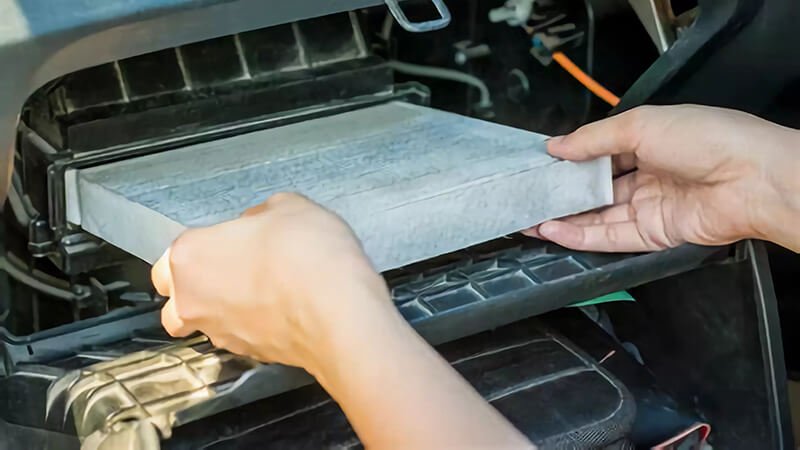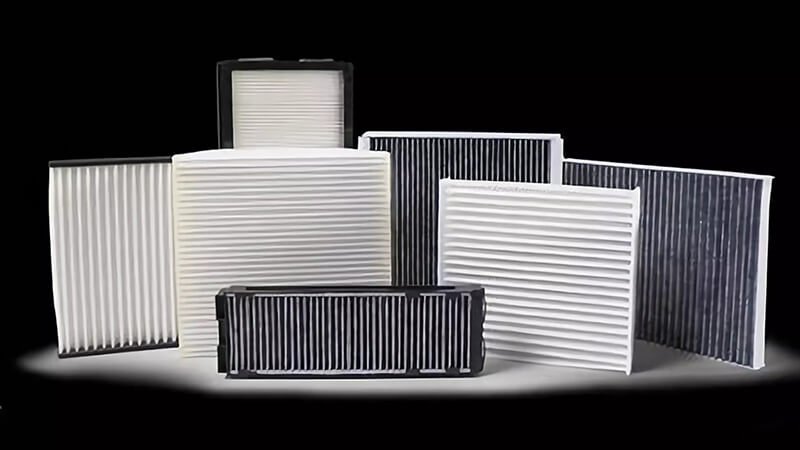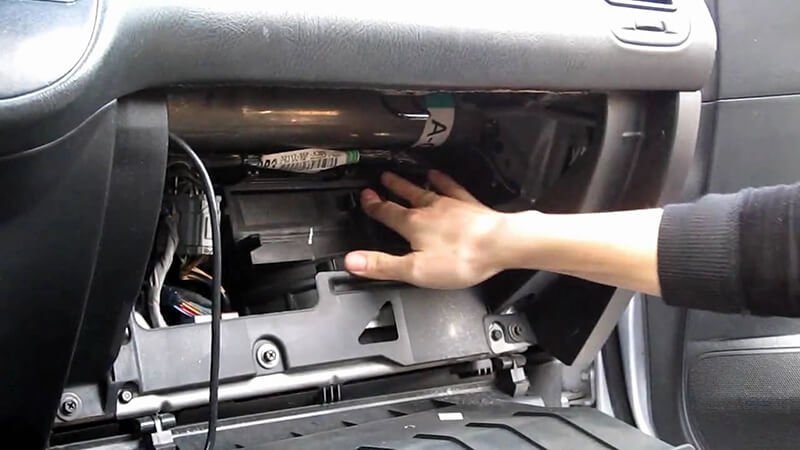A cabin air filter plays a crucial role in maintaining the quality of the air inside your vehicle. But many drivers overlook its importance until it’s too late. Understanding what a cabin filter does can help you make informed decisions about its maintenance and replacement.
A cabin air filter filters out dust, allergens, and pollutants from the air that enters your vehicle's cabin. This ensures a cleaner and healthier environment for you and your passengers while improving the performance of your HVAC system.
Now that we understand its purpose, let’s address some common questions people have about cabin air filters and how they affect your vehicle’s performance and air quality.

Is a cabin air filter really necessary?
You might be asking if a cabin air filter 1 is essential for your vehicle. Many car owners assume it’s just an extra feature, but the truth is, it plays an important role in your driving experience2 and health3.
Yes, a cabin air filter is necessary. It prevents dust, pollen, and pollutants from entering your vehicle’s cabin, ensuring a cleaner, healthier environment. Without it, the air quality inside your car can degrade significantly, especially if you have allergies or respiratory conditions.
A cabin air filter is an important yet often overlooked component in your vehicle. Here's why it’s necessary:
Improved Air Quality
The primary function of a cabin air filter is to filter out contaminants from the outside air before it enters your vehicle. It traps dust, dirt, pollen, mold spores, and other pollutants. This is especially important if you have respiratory issues like asthma or allergies. Clean air ensures a more comfortable driving experience and can reduce symptoms caused by allergens.
Pollutants commonly filtered by cabin air filters:
| Pollutant Type | Source | Impact on Health |
|---|---|---|
| Dust | Road dirt, construction sites | Respiratory problems, allergic reactions, coughing, wheezing |
| Pollen | Trees, plants, flowers | Hay fever, sneezing, itchy eyes, runny nose, sinus congestion |
| Mold spores | Humid environments, water leaks | Allergies, asthma exacerbation, lung irritation, coughing |
| Smoke particles | Nearby vehicles, factories | Respiratory issues, discomfort, sore throat, fatigue, irritation in eyes and nose |
| Exhaust fumes | Traffic, industrial areas | Long-term lung damage, headaches, dizziness, increased risk of heart disease |
HVAC System Protection
A cabin air filter also helps protect the heating, ventilation, and air conditioning (HVAC) system in your vehicle. Without the filter, debris and dirt can accumulate in the system, which may lead to blockages and reduced airflow. This can put extra strain on your HVAC components, potentially leading to costly repairs.
The air conditioning system, if not protected, can also harbor mold or mildew, further affecting the air quality. By keeping the system clean, the cabin air filter ensures a longer lifespan for HVAC components.
Prevention of Foul Odors
Another crucial benefit of a functioning cabin air filter is odor control. Filters trap unpleasant smells from outside sources, such as exhaust fumes, animal odors, or polluted air. If your filter is clogged or old, you may notice unpleasant smells circulating inside the cabin. These odors could be harmful and cause discomfort during travel.
Overall, a cabin air filter is necessary to improve air quality, protect your vehicle’s HVAC system, and ensure a more pleasant driving experience.

Can I run my AC without a cabin air filter?
If you’ve ever wondered whether it’s possible to run your air conditioning without a cabin air filter, the short answer is: it’s not a good idea. Let’s take a closer look at why.
While technically you can run your AC without a cabin air filter, doing so is not recommended. Without the filter, your air conditioning system can become clogged with dust4 and debris5, leading to reduced performance and potential damage.
Running your air conditioning without a cabin air filter may seem like a minor issue, but it can cause long-term problems. Here's why:
Reduced Airflow6
The cabin air filter helps regulate airflow through your HVAC system. Without it, dust and dirt can accumulate in the air ducts, obstructing airflow. This can lead to a decrease in the effectiveness of your air conditioning and heating system, making your car less comfortable to drive, especially on hot days.
Damage to AC Components
Running your AC without a cabin air filter puts unnecessary stress on the system. The dirt and dust that bypass the filter can clog vital components such as the evaporator coils. Over time, this can cause these components to wear out prematurely, leading to expensive repairs or replacements.
In the long run, neglecting the cabin air filter can lead to clogged components like the blower motor or condenser, which may also contribute to overheating, system failure, or increased maintenance costs.
Poor Air Quality7
Without the filter, harmful particles from the outside air can enter your cabin unfiltered. This increases your exposure to allergens8, pollutants, and other contaminants, making your driving experience less pleasant, especially if you suffer from allergies."
Increased Health Risks
Running your AC without a cabin air filter can also pose health risks. Prolonged exposure to pollutants like car exhaust, industrial fumes, or even mold can affect your respiratory health, causing discomfort, irritation, or exacerbating pre-existing conditions like asthma or allergies.
In conclusion, running your AC without a cabin air filter may seem like a shortcut, but it can lead to decreased comfort, increased wear and tear on your HVAC system, and poor air quality. It’s best to keep the filter in place for optimal performance and air quality.

Can I drive without a cabin air filter?
It’s a common question: can you drive without a cabin air filter? While your vehicle may still operate without it, it’s not advisable. Let’s explore the potential consequences of driving without a cabin air filter.
You can technically drive without a cabin air filter, but it’s not recommended. Without the filter, dust9, allergens10, and other debris11 can enter the cabin, making the air quality worse and potentially damaging your vehicle’s HVAC system.
While it is possible to drive without a cabin air filter, here are the consequences you should consider:
Decreased Air Quality
Without the filter, outside air will flow directly into your vehicle’s cabin, bringing pollutants, dust, pollen, and other harmful particles. This can make the air inside your vehicle uncomfortable and even unhealthy, especially for those with allergies or respiratory conditions. For example, during allergy season, pollen can accumulate quickly, aggravating symptoms and affecting your overall comfort."
| Air Quality Impact | Effect on Health | Example Scenario |
|---|---|---|
| Polluted air | Respiratory discomfort | Driving near factories, industrial areas |
| Pollen | Hay fever, sneezing | Driving during spring in rural or park areas |
| Dust | Asthma, itchy eyes | Driving on dirt roads or construction zones |
HVAC System Issues
Driving without a cabin air filter can lead to debris buildup in your HVAC system, which can cause blockages and reduce the system's efficiency. Over time, this can lead to expensive repairs or replacements, as dirt and debris can damage sensitive components like the blower motor or evaporator.
Foul Smells
If the filter is removed, your vehicle may begin to emit unpleasant odors from external sources. Polluted air, exhaust fumes, and even smells from nearby plants or animals can enter the cabin, creating an unpleasant environment for you and your passengers. A clogged filter can also contribute to foul odors by trapping moisture and allowing mold or mildew to develop.
Driving without a cabin air filter compromises both the air quality inside your vehicle and the performance of your HVAC system. It’s always better to replace a dirty or old cabin air filter than to drive without one.

What happens if you don't change cabin air filter?
Failing to change your cabin air filter can have several negative effects on both your vehicle’s air quality12 and its HVAC system. Let’s explore what happens when you neglect this important maintenance task.
If you don’t change your cabin air filter, it will become clogged with dirt13 and debris14, leading to reduced airflow, poor air quality, and potential damage to your vehicle’s HVAC system. Regular maintenance is crucial to avoid these issues.
Neglecting to replace your cabin air filter can lead to various problems, some of which can be costly and affect your driving experience:
Clogged Filter
The cabin air filter collects dirt, dust, and allergens. Over time, it becomes clogged and loses its ability to effectively filter the air. This leads to reduced airflow, making your air conditioning and heating system less effective. If you notice a decrease in airflow, it could be a sign that your filter needs replacing."
| Effect of Clogged Filter | Result | Solution |
|---|---|---|
| Reduced airflow | AC/heating system struggles | Replace the filter |
| Increased energy use | Strained system needs more power | Change filter regularly |
| Higher cabin temperature | AC struggles to cool down | Install a new filter |
Poor Air Quality
A clogged cabin air filter can also allow pollutants to bypass it, degrading the air quality inside your vehicle. Dust, pollen, and harmful particles will enter the cabin, which can be particularly harmful for those with allergies or asthma. Over time, this can make your driving experience uncomfortable and unhealthy.
HVAC System Damage
When a cabin air filter becomes clogged, the HVAC system has to work harder to push air through the filter. This can put strain on the system and cause components like the blower motor or evaporator to fail. Replacing the filter on time prevents these costly repairs.
Foul Odors
A dirty filter can also cause unpleasant odors to circulate inside the cabin. Mold and mildew can build up on the filter, and this can produce a musty smell. Regular filter changes help prevent this issue, ensuring fresh and clean air inside your vehicle.
Changing your cabin air filter regularly is an easy and cost-effective way to maintain both air quality and the efficiency of your vehicle’s HVAC system.

Conclusion
In conclusion, the cabin air filter is a crucial component of your vehicle that helps ensure good air quality and protects your HVAC system. It is necessary for a comfortable and healthy driving experience. Always change your cabin air filter regularly to avoid problems like reduced airflow, poor air quality, and potential HVAC damage. A little maintenance can go a long way in preserving your vehicle's performance and your health.
-
Learn about the importance of cabin air filters and why they are essential for vehicles. ↩
-
Discover the connection between clean air and a comfortable driving experience. ↩
-
Understand the health implications of driving in poor air quality. ↩
-
Understand how dust can negatively affect the efficiency and longevity of your AC system. ↩
-
Discover how debris can damage your car's AC system and lead to costly repairs. ↩
-
Learn how poor airflow can affect your car’s AC and heating systems. ↩
-
Find out how maintaining a cabin air filter improves the air quality inside your car. ↩
-
Learn about the types of pollutants that can compromise air quality and health inside a vehicle. ↩
-
Learn how dust can negatively affect the air quality inside your vehicle. ↩
-
Discover how allergens can reduce comfort and affect health in the car cabin. ↩
-
Find out how debris can damage your car’s HVAC system and reduce its efficiency. ↩
-
Understand how a clogged filter impacts the air quality inside your vehicle. ↩
-
Discover how dirt accumulates in the filter and reduces its effectiveness. ↩
-
Find out how debris in your air filter can lead to system damage and poor air quality. ↩












